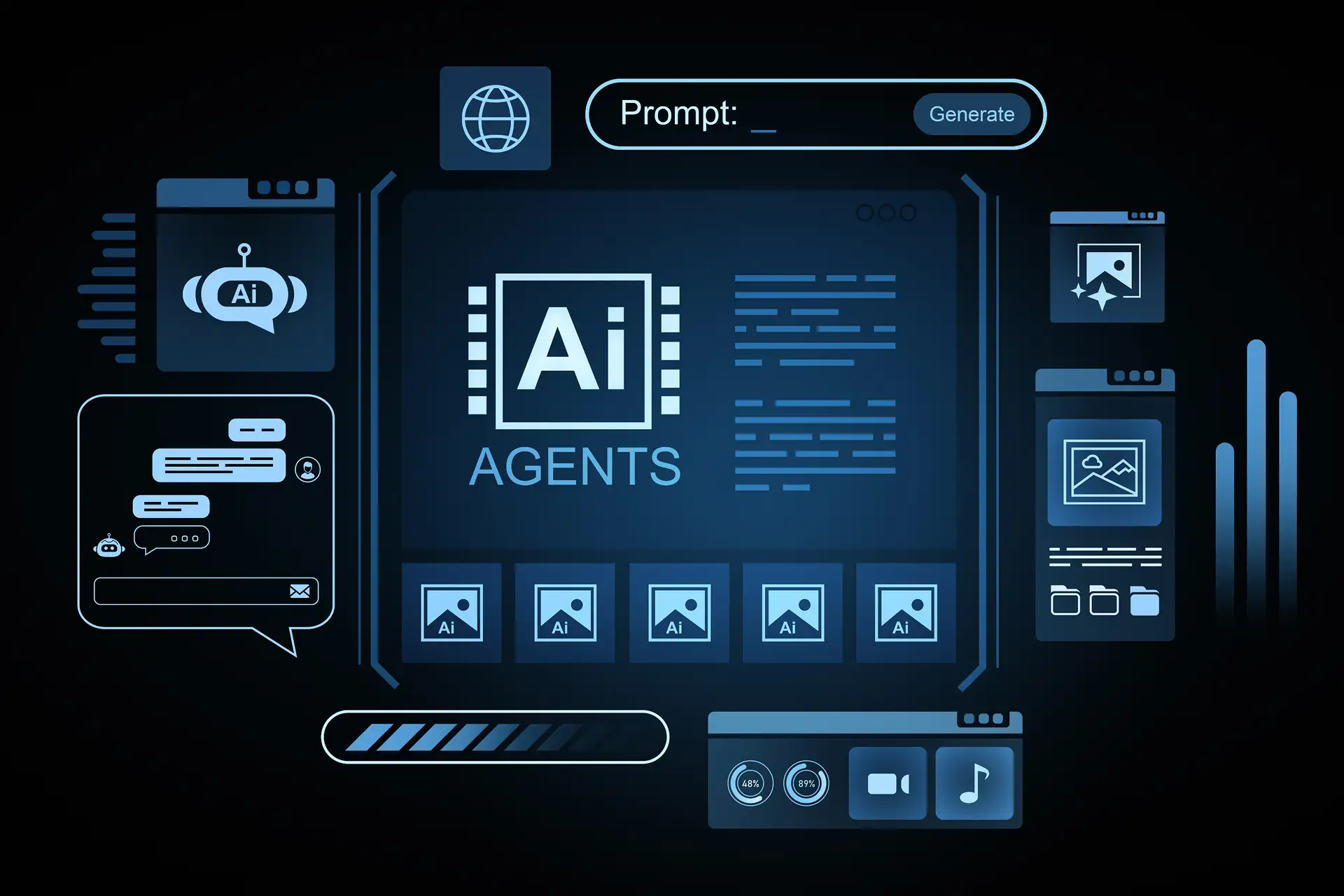Marketing
What is Digital Marketing?

In today's hyper-connected world, your customers are online. They are searching for solutions, comparing products, reading reviews, and making purchasing decisions on their computers and smartphones. The fundamental question for any new or established business owner is no longer if you need to be online, but how you can effectively connect with this digital audience. The answer lies in digital marketing.
At its core, digital marketing encompasses all marketing efforts that use an electronic device or the internet. It's a broad field that includes a variety of strategies and tactics used to reach consumers online. Unlike traditional marketing methods like print ads or billboards, digital marketing offers an unprecedented ability to target specific demographics, measure results with remarkable accuracy, and engage directly with your audience. For small businesses, this isn't just an alternative; it's a powerful equalizer that allows you to compete with larger corporations on a more level playing field. This guide will demystify the core components of digital marketing, explore advanced concepts often overlooked in introductory articles, and provide actionable insights for business owners ready to grow their online presence.
Search Engine Optimization (SEO): The Foundation of Discoverability
Search Engine Optimization (SEO) is the practice of increasing the quantity and quality of traffic to your website through organic search engine results. When your potential customers need a product or service, their journey often begins with a query on a search engine like Google. SEO is the art and science of ensuring your business appears prominently in those results.
While many associate SEO with simply using the right keywords, its modern practice is far more sophisticated. Google's algorithms now prioritize understanding user intent—the why behind a search. Are they looking for information, comparing options, or ready to make a purchase? A successful SEO strategy aligns your website's content with these intents. For a local bakery, targeting "best birthday cakes in [City]" is more effective than just "cake" because it captures a user with a clear purchasing intent.
A critical, yet often undiscussed, aspect of modern SEO is Google's E-E-A-T framework, which stands for Experience, Expertise, Authoritativeness, and Trustworthiness. Google wants to recommend content from sources that are credible and reliable. For a small business, this means showcasing your real-world experience, demonstrating your expertise through detailed blog posts or case studies, building authority with positive reviews and mentions from other reputable local sites, and fostering trust with a secure, professional website. According to a study by BrightLocal, 87% of consumers used Google to evaluate local businesses, highlighting the non-negotiable importance of a strong, trustworthy presence in search results.
Content Marketing: Building Relationships and Authority
If SEO is the foundation, content marketing is the structure you build upon it. Content marketing is a strategic approach focused on creating and distributing valuable, relevant, and consistent content to attract and retain a clearly defined audience—and, ultimately, to drive profitable customer action. It’s about providing value before you ask for a sale.
Effective content marketing goes beyond just writing a weekly blog post. It involves a diverse ecosystem of formats, including in-depth guides, instructional videos, podcasts, infographics, and customer testimonials. The key is to create "pillar content"—a substantial piece of content on a topic central to your business—and then create smaller, related pieces (topic clusters) that link back to it. This strategy signals to search engines that you are an authority on the subject.
One of the most underutilized strategies for time-strapped small business owners is content repurposing. A single, well-researched blog post can be transformed into a dozen social media updates, a script for a short video, key points for an email newsletter, and a downloadable checklist. This maximizes the return on your initial time investment. Remember, the goal of content is not just to attract visitors but to convert them into leads. HubSpot data indicates that businesses that prioritize blogging are 13 times more likely to see a positive ROI, demonstrating its power as a long-term growth engine.
Generative Engine Optimization (GEO): Optimizing for AI Answers
As search engines evolve with artificial intelligence, a new and crucial discipline is emerging: Generative Engine Optimization (GEO). This moves beyond traditional Search Engine Optimization (SEO), which primarily focuses on ranking your website in the familiar list of blue links. GEO is the practice of optimizing your content to be featured directly within the AI-generated answers and conversational summaries that now appear at the top of search results pages. For many users, this AI-powered snapshot is their first and sometimes only interaction, providing a direct answer without requiring a click to a website. For small businesses, this represents a monumental shift. The objective is no longer simply to rank for a keyword, but to become such a trusted and authoritative source that the search engine's AI model cites your business and information directly. This requires creating exceptionally high-quality, comprehensive, and well-structured content that answers your customers questions more thoroughly than anyone else, positioning your business as the definitive solution in the age of AI-driven search.
Social Media Marketing: Engaging Communities, Not Just Broadcasting
Social media marketing involves using platforms like Facebook, Instagram, LinkedIn, and X (formerly Twitter) to build your brand, drive website traffic, and increase sales. However, many businesses fall into the trap of using social media as a one-way broadcast channel, simply posting promotional material. True success lies in building and engaging with a community.
The first step is choosing the right platforms. A B2B consulting firm will likely find more value on LinkedIn, while a visually-driven brand like a clothing boutique or restaurant will thrive on Instagram and Facebook. The key is to be where your target audience is most active.
Beyond platform selection, modern social media marketing leverages social commerce the ability for customers to browse and purchase products directly within the app. Features like Instagram Shops and Facebook Marketplace have streamlined the path from discovery to purchase. Furthermore, fostering user-generated content (UGC) by encouraging customers to share photos with your product is a powerful form of social proof. It acts as an authentic endorsement that is more trusted than brand created content. In fact, consumers find UGC 9.8x more impactful than influencer content when making a purchasing decision, according to Nosto.
Email Marketing and Automation: Nurturing Leads and Driving Retention
Email marketing remains one of the most effective digital marketing channels, consistently delivering a high return on investment. It's a direct line of communication to individuals who have already expressed an interest in your business by subscribing. However, its true power is unlocked through automation.
Marketing automation allows you to send triggered, personalized emails to subscribers based on their actions. For example:
- Welcome Series: A sequence of automated emails sent to new subscribers to introduce your brand, showcase your value, and offer an initial incentive.
- Abandoned Cart Reminders: For e-commerce businesses, an automated email reminding a customer about items left in their shopping cart can recover a significant percentage of lost sales.
- Lead Nurturing: If a user downloads a guide from your website, you can automatically send them a series of related, helpful emails that gradually guide them toward making a purchase.
This level of personalization builds a stronger customer relationship than generic, mass-emailed newsletters. It makes the customer feel seen and understood, fostering loyalty and increasing customer lifetime value (CLV).
The Critical Role of Analytics and Data
One of the greatest advantages of digital marketing is its measurability. However, many business owners are intimidated by analytics or focus on vanity metrics like "likes" or "page views." To make informed business decisions, you must focus on data that impacts your bottom line.
Tools like Google Analytics 4 (GA4) provide a wealth of information, but you need to know what to look for:
- Conversion Rate: What percentage of your website visitors are taking a desired action (e.g., filling out a contact form, making a purchase, signing up for your newsletter)? This is arguably the most important metric for gauging the effectiveness of your website.
- Traffic Sources: Where are your visitors coming from? Organic search, social media, direct traffic, or paid ads? Understanding this helps you focus your efforts on the channels that are delivering the most valuable traffic.
- User Engagement: How long are users staying on your pages? Are they visiting multiple pages? High engagement signals that your content is valuable and relevant to your audience.
Analyzing this data allows you to move from guesswork to a data-driven strategy, optimizing your marketing spend and efforts for maximum impact.
Online Reputation Management: The Unsung Hero
What people say about your business online is a crucial component of your digital marketing. Online reputation management is the process of monitoring and influencing how your business is perceived across the web, primarily through online reviews on platforms like Google Business Profile, Yelp, Bing Places, and industry-specific sites.
A steady stream of positive reviews is a powerful asset. It builds trust with potential customers and is a significant ranking factor for local SEO. A BrightLocal survey found that 76% of consumers ‘always’ or ‘regularly’ read online reviews when browsing for local businesses. Ignoring reviews both positive and negative is a missed opportunity. Responding professionally to negative reviews can often turn a dissatisfied customer into a loyal one, and it shows prospective customers that you care about customer service. Actively encouraging satisfied customers to leave a review should be an integral part of your business process.
Conclusion: Your Partner in Digital Growth
Digital marketing is not a single activity but an integrated system of strategies and tactics working together to achieve your business goals. From building a discoverable foundation with SEO and E-E-A-T to creating valuable connections through content and social media, and from nurturing leads with email automation to protecting your brand with reputation management, each piece is essential for sustainable growth. It's a dynamic and evolving field that requires continuous learning, testing, and adaptation.
For a busy business owner, navigating this complex landscape can feel overwhelming. That is where a dedicated partner can make all the difference. At LTN Business, we specialize in crafting and executing comprehensive digital solutions tailored to your unique needs. Whether you are a new business just laying your digital foundation or a mature business looking to optimize and expand your online reach, our team has the expertise to help you succeed. We handle the complexities of digital marketing so you can focus on what you do best: running your business. Let us help you unlock your full potential online and turn your digital presence into your most powerful asset.
The
Team










.svg)
















